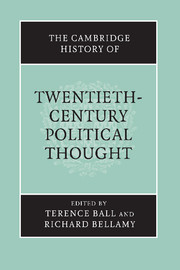Book contents
- Frontmatter
- Editors’ introduction
- Part I The changing fortunes of liberal democracy
- Part II Varieties of Marxism
- Part III Science, modernism and politics
- 15 Positivism: reactions and developments
- 16 Postmodernism: pathologies of modernity from Nietzsche to the post-structuralists
- 17 Weber, Durkheim and the sociology of the modern state
- 18 Freud and his followers
- 19 Modernism in art, literature and political theory
- 20 The new science of politics
- 21 Utilitarianism and beyond: contemporary analytical political theory
- Part IV New social movements and the politics of difference
- Part V Beyond Western political thought
- Biographies
- Bibliography
- Subject index
- Name index
- References
15 - Positivism: reactions and developments
from Part III - Science, modernism and politics
Published online by Cambridge University Press: 28 March 2008
- Frontmatter
- Editors’ introduction
- Part I The changing fortunes of liberal democracy
- Part II Varieties of Marxism
- Part III Science, modernism and politics
- 15 Positivism: reactions and developments
- 16 Postmodernism: pathologies of modernity from Nietzsche to the post-structuralists
- 17 Weber, Durkheim and the sociology of the modern state
- 18 Freud and his followers
- 19 Modernism in art, literature and political theory
- 20 The new science of politics
- 21 Utilitarianism and beyond: contemporary analytical political theory
- Part IV New social movements and the politics of difference
- Part V Beyond Western political thought
- Biographies
- Bibliography
- Subject index
- Name index
- References
Summary
Born of the aspiration of Saint-Simon and Comte to cleanse science of metaphysics, ‘positivism’ came to signify the nineteenth-century desire to make natural science the sole model of knowledge, even for inquiries into human history and culture. Many thinkers, while not hostile to science or intellect as such, began to chafe at this restriction (Collingwood 1946, p. 134). In contesting the hegemony of natural science, anti-positivists typically appealed to two important forms of human experience which fell outside its domain. Some pointed to the consciousness and self-consciousness which soared above the phenomenal domain of natural science, while others unearthed the unconscious or pre-conscious aspects of mental life which lay below it.
Consciousness was celebrated by idealist philosophers as the indispensable basis of both knowledge and freedom, practically a substitute for God. Pragmatists, on the other hand, saw experience not in conscious concepts but in the ‘blooming buzzing confusion’ of the pre-conscious mind experiencing the world. Even more subversive of the consciously rational agent presupposed by idealists and positivists alike were the inquiries of writers like Nietzsche, Bergson and Freud, who evoked the many and subtle ways in which unconscious motives influence behaviour. Whether appealing to consciousness or unconsciousness, then, reactions to positivism stressed aspects of the human mind which mechanistic pictures of natural science were unable to grasp.
- Type
- Chapter
- Information
- The Cambridge History of Twentieth-Century Political Thought , pp. 319 - 342Publisher: Cambridge University PressPrint publication year: 2003

